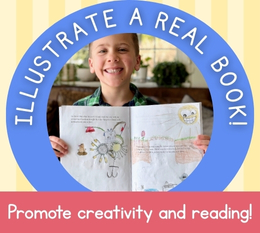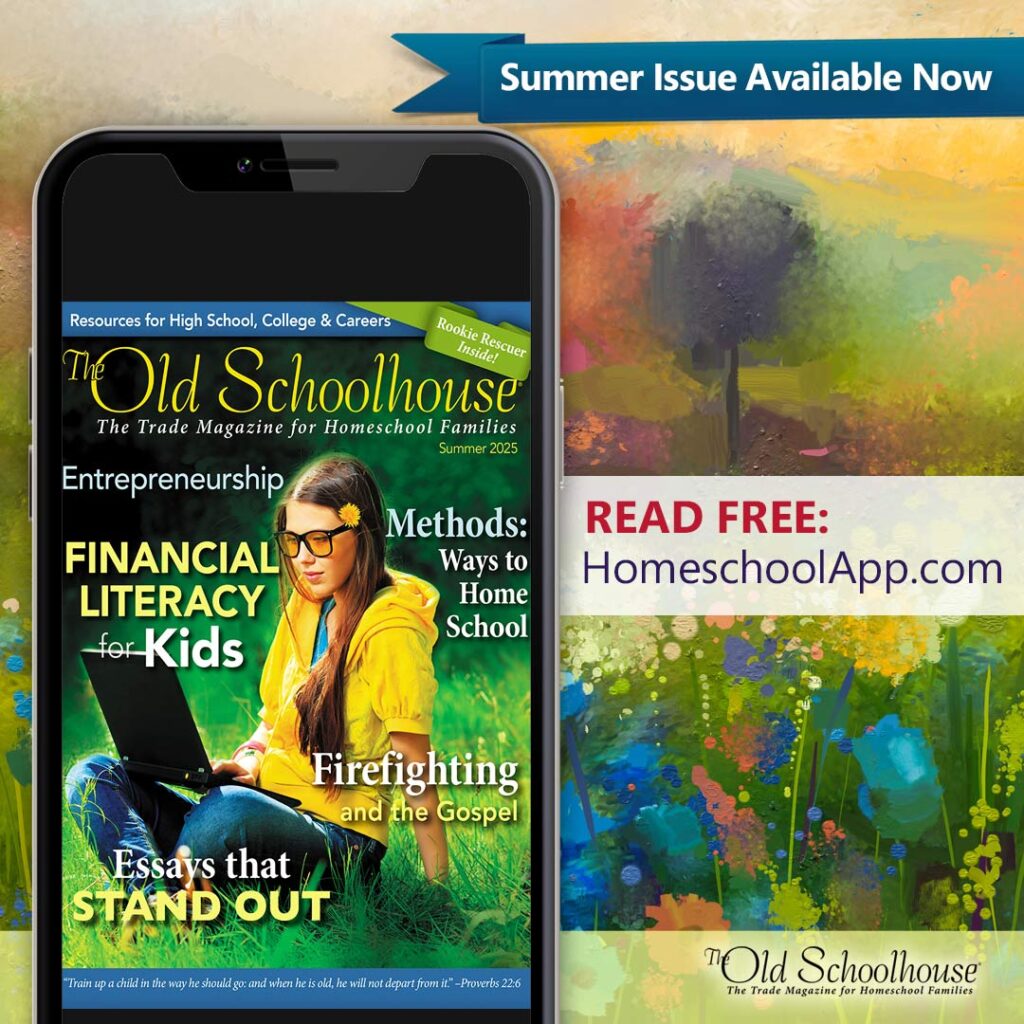The Old Schoolhouse® Product & Curriculum Reviews
With so many products available we often need a little help in making our curriculum choices. The Old Schoolhouse® Magazine family understands because we are in the same boat! Do you need more information on a product before you buy? With over 5,500 products listed in 52 easy-to-use categories, much of the information you need to know is only a click away! Let our reviewer-families help yours.
The Relaxed Home School Review by Kayla Atkins Rokosz
Mary Hood, Ph.D.Ambleside Educational Press
P.O. Box 2524
Cartersville, GA 30120
Reviewed in2015
http://www.archersforthelord.org/
The Relaxed Home School is a soft cover, 106-page book that retails for $10.95. It encourages homeschoolers to be more “relaxed” in their approach to education—relaxed, but in control. In a nutshell, “relaxed” homeschooling is the middle ground between the educational philosophies of unschooling and the more regimented style that tries to duplicate institutional schooling in your home.
This book takes a clever approach to moving you from beginning to end. Dr. Hood takes the reader through a play production. Some chapter titles are “The Production Crew,” “Writing the Script, Act 1: Natural Literacy,” “On to Broadway!” and even “Answering the Critics.”
The style and drama approach worked beautifully for me. I have a background in theater and have been in a lot of plays from high school to the time I started having babies. The analogies made perfect sense to me; however, I can see where that style may be difficult for people who have not spent much time on the stage to understand. The book will still be useful and make sense if you don’t have a theater background, but if you do, it will add another layer of meaning to the chapters.
This is not a long book, but it is packed with many examples and thought-provoking ideas that can be adopted, or adapted, for your own homeschool. I took notes as I read, partly because I was reviewing the book, but mostly because there were so many good ideas I either needed to take notes or highlight the book so I could find the information again.
I wish I could have traveled back in time to read this before we started homeschooling in 2002. It would have helped me to worry less about messing up my kids if I didn’t do school like a “regular” school. I would have thought things through and had my own educational philosophy before I started. For instance, how do I feel about testing? Is it necessary or not? Just by taking Dr. Hood’s advice and really thinking through our educational philosophies and our long-term goals for each child, we could have saved a great deal of money on what turned out to be unnecessary curriculum purchases. The curricula had nothing wrong with them, but they are sitting on our shelves, unused, because they really were not a good fit for us.
Something simple, yet profound Dr. Hood wrote was to ask yourself, “When I picture my kids at 18 years old, what is it that I want to see?” This has stuck with me. She said to ask this question when you are thinking about your goals and plans for your children.
Once you have answered the question of what you want to see in your 18-year-old, then you can work backward and figure out a way to reach those goals. Dr. Hood has split her goals for her children into six areas: values, attitudes, habits, skills, individual talents/interests, and general knowledge.
I think parents sometimes start at the bottom of that list in the general knowledge area (school) or individual talents and interests (sports, music, etc.) and don’t spend as much time thinking about the other areas. As a Christian household, we have tried to have impart values that line up with Biblical principles. As a Christian homeschooling household, we have been able to spend quite a bit of time trying to instill the importance of the proper attitude in life and learning valuable life skills. However, I have never actually pictured my kids at 18 and asked myself what values, attitudes, habits, skills, talents, and knowledge I hope they possess. If I am honest, picturing my kids at age 18, ready to leave home, makes me a little weepy, but I do see the value in looking ahead to make sure I am helping them to become a person who has a good balance of those attributes.
Dr. Hood also solidified a concept that we have all heard. Take care of yourself . . . first.
She expanded on this in a way that I both understood and agreed with. She covered the obvious things like making sure you have enough sleep and the need for peace and quiet. The part she covered that really got to me was the part about NOT putting all your hobbies and interests on a shelf because you no longer have time for them. She explained that if I give up all the things I love doing my kids would grow up never really knowing who I am. That made me stop and remember all the times I have said to my kids, “I used to do that,” “I used to like doing that,” “I always loved doing that.” They were all past tense statements. I had never thought that giving those things up prevented my kids from knowing the real me.
Dr. Hood and I have a similar approach to family when it comes to activities and how many we allow into our lives. With a large family, this has to be monitored carefully because it is easy to become overwhelmed if too many of us are in too many extra things outside our home. Time management and efficiency have been important to me ever since my oldest was born. At that time, it was because my husband and I were both working (opposite shifts), so we had to make sure we were where we needed to be at a certain time so we wouldn’t be late. As we have added to our family and I now work from home, it is still important to the basic success of our days.
Part of The Relaxed Homeschool mindset is being in control. I know it sounds like an oxymoron, but you can’t let outside things, whether a curriculum, a set-in-stone schedule, or too many activities, steal from the flexibility, balance, and mutual respect in a relaxed homeschool setting. You do need to have some parameters and plans in place to be successful. You have to, as Dr. Hood suggests, set the stage. Anyone who has been in a show can attest to the fact that there is a lot of work that goes on behind the scenes before anyone sees it.
The chapter called “Act 1: Natural Literacy” was extremely interesting to me. I loved her analogy of what would happen if a panel of experts came together to create the magic list of what your baby needs for “talking readiness” like they do for pretty much everything else these days. I found her thoughts on shows like Sesame Street and what has changed in our society to be spot on. It made me realize why I have always said that kids do not need preschool to be successful in school or life!
I also loved her approach to, as she called it, “judicious quitting” for those times when you are having to “force” your kids to play that award-winning phonics game or read that book that some expert has said needs to be read at this age. When you get to the “forcing” stage, it is okay to quit, for now, and pick it up again later when the time is right. It does not mean you have failed.
One of the best parts of homeschooling for us has been our ability to travel and see things when everyone else is in school. Dr. Hood talks about the importance of giving your kids a variety of background experiences because it will help them in countless ways. When they are reading books about airplanes or airports, my kids will have a picture in their mind of the ones they have seen. If we read about dairy cattle or farm life, my kids will be able to draw on their experiences of visiting a family with a large dairy farm on one of our visits to Indiana. It doesn’t feel like “school,” but it will help them in their schooling for years to come.
I found this book very helpful, as a homeschooling mom, with my general mindset, but there were many things that were specifically helpful to me as I thought about each of my kids, like my epiphany about my youngest son’s determination to hold his pencil all wrong and my continual battle with him (going on four years now) to do it “right.” His writing is legible. His hand hasn’t become deformed or broken from holding the pencil “wrong.” So, with the encouragement from Dr. Hood, I will relax and let it go since it works for him.
Dr. Hood shares practical ideas, subject by subject, for things that have worked well in her own relaxed home school. Many of the things she tried, we have already implemented in our school. For example, in her section on teaching science, she said they tend to look for science in their everyday world. Why does the cake rise when baking? Why does a big bubble come up when we push a glass upside down to the bottom of the tub? We have questions and discussions like this all the time, and like Dr. Hood, we don’t necessarily rush to give the kids the answers. Unlike Dr. Hood, we use an actual science textbook for our everyday lessons.
One of the best things about this book, especially if you are a new homeschooler, is that it is like an interview with a veteran homeschooler. It doesn’t read like an interview, but the way she goes through what works for their family and what they have tried in the past is just what every new, nervous homeschooling parent wants to know. Dr. Hood’s approach and, I think, her goal is to encourage parents to find the courage to seize control of their children’s education. Top to bottom. Inside and out. To not worry about following the traditional path. Following an individualized and “relaxed” approach might just be the perfect fit for your family.
-Product Review by Kayla Atkins Rokosz, The Old Schoolhouse® Magazine, LLC, January, 2015
Do you want to get the word out about your product or service to the homeschool community? Email the TOS Advertising & Sales Director, and share a little about what you´d like showcased, and we can help with that! Also, check out the magazine’s media kit and rate card at www.Homeschool.Market.

















































